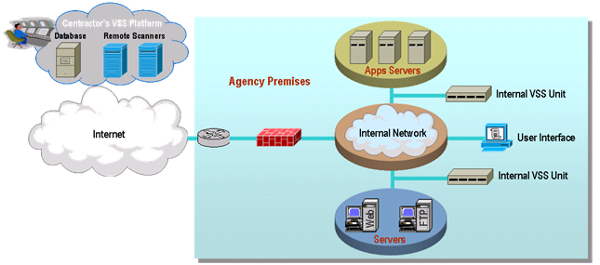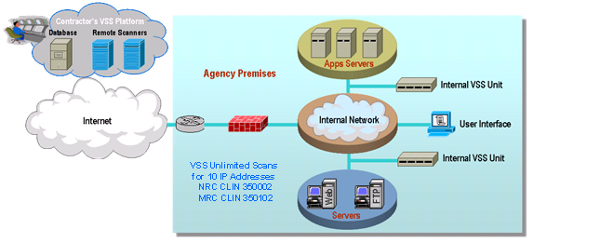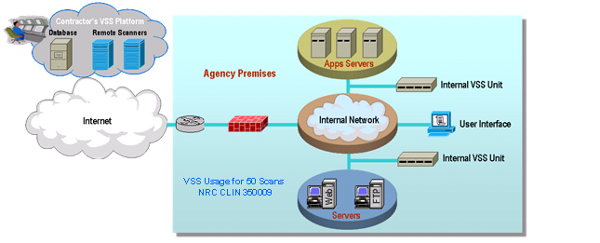The Networx contracts require a basic level of security management for its contractors that ensures compliance with Federal Government generally accepted security principles and practices, or better. The contracts employ adequate and reasonable means to ensure and protect the integrity, confidentiality, and availability of Networx services, Operational Support Systems (OSS), and Government information transported or stored in the contractor's Networx services infrastructure. These requirements are detailed in Section C.3.3.2 Security Management of the Networx contracts.
In addition to this mandatory level of security, the Networx contracts provide additional security services that may be ordered on a fee-for-service basis. These are:
The VSS offering is described below.
VSS allows Agencies to conduct effective and proactive assessments of critical networking environments, and correct vulnerabilities before they are exploited. VSS searches for security holes, flaws, and exploits on Agency systems, networks and applications. VSS helps to guard the Agency network infrastructure against emerging threats.
VSS builds on the FTS2001 contracts offerings. The service connects to and interoperates with the Agency networking environment, including Demilitarized Zones (DMZs) and secure LANs as required by the Agency. The service also supports Internet connectivity.
The Agency may order one or more of the following:
The diagram below illustrates a sample VSS implementation. Illustrative hardware such as edge routers, firewalls and Agency servers are not provided as part of the VSS.

VSS also provides an Application Programming Interface (API) feature. This allows the Agency to integrate the service into its own tools and applications, as required, using for example, a standard Extensible Markup Language (XML) API. This enables Agency security personnel to assess the vulnerabilities of hosts, export vulnerability data, etc.
VSS tests for vulnerabilities by comparing scanned information to threat data contained in a database. VSS can also simulate a real intrusion in a controlled environment, in order to gauge a network's susceptibility to attacks. The service performs external scans by remotely probing a network for vulnerabilities that generally come from the outside; and internal scans which detect flaws originating from the inside.
VSS supports a range of technical capabilities that are available in commercial offerings. The contractor establishes, implements, and maintains the vulnerability scanning service, which operates on a 24x7 basis. The systems periodically probe networks, including operating systems and application software, for potential openings, security holes, and improper configuration. VSS explores vulnerabilities in, but not limited to, the following areas as applicable:
The VSS contractor proactively identifies network vulnerabilities, and proposes appropriate countermeasures, fixes, patches, and workarounds. The contractor notifies the Agency of vulnerabilities discovered, and also provides secure Web access to vulnerability information, scan summaries, device/host reports, and trend analyses. VSS provides scan scheduling flexibility to the Agency in order to minimize any interruptions in normal business activities. The service also supports non-destructive and non-intrusive vulnerability scans that will not crash the systems being analyzed, or disrupt Agency operations. The scans will not provoke a debilitating denial of service condition on the Agency system being probed. The VSS scanning engine is regularly updated with new vulnerabilities information in order to maintain effectiveness of the service. These and other VSS service capabilities are detailed in Section C.2.10.3.1.4 Technical Capabilities of the Networx contracts.
VSS is required to support the User-to-Network Interfaces (UNIs) defined in applicable Networx services, for example:
C.2.4.1 Internet Protocol Service (IPS). C.2.7.2 Premises-based IP VPN Services (PBIP-VPNS). C.2.7.3 Network-based IP VPN Services (NBIP-VPNS).
Each Networx contractor may provide variations or alternatives to the offering and pricing for VSS. The specific details can be found within each Contractor's Networx contract files and pricing notes for VSS.
For more information on the general VSS specifications and requirements, please refer to Section C.2.10.3 of the Networx contract for technical specifications and Section B.2.10.3 for pricing.
VSS provides external and internal vulnerability assessments of the Agency's networking environment. The service mitigates security holes and flaws before they are exploited. VSS provides the following pricing options:
VSS builds on the FTS2001 contracts offerings.
Price components required for service are:

Example 2: VSS Usage for 50 scans

Each Networx contractor may provide variations or alternatives to the offering and pricing for VSS. The specific details can be found within each Contractor's Networx contract files and pricing notes for VSS.
For more information on the general VSS specifications and requirements, please refer to Section C.2.10.3 of the Networx contract for technical specifications and Section B.2.10.3 for pricing.